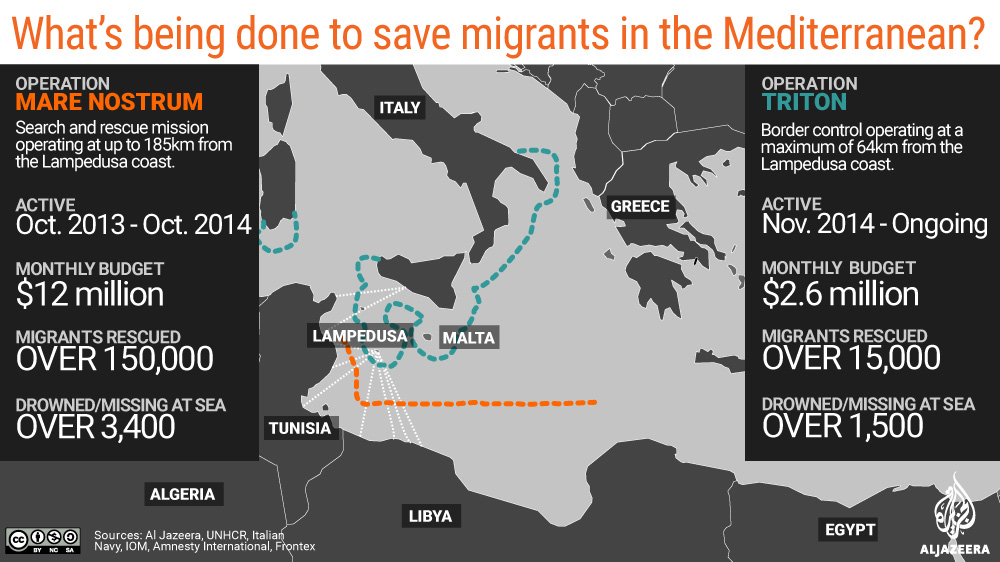EU backs naval mission to tackle migrant crisis
New force to target gangs smuggling people from Libya and intercept human smugglers before migrant boats reach Europe.

The European Union has approved a naval mission to target gangs smuggling migrants from Libya but parts of a broader plan to deal with the influx have got caught in a row over national quotas for housing asylum seekers.
EU ministers held talks in Brussels on the migrant crisis in the Mediterranean Sea and approved a plan on Monday to back a proposal for a new naval force to intercept people smugglers before their boats reach Europe.
Keep reading
list of 4 itemsGeorgia’s ‘foreign agents’ bill: What’s the controversy about? What’s next?
What’s at stake in next month’s European elections?
EU to drop rule-of-law dispute with Poland
Many hundreds of deaths at sea, including the drowning of up to 900 on a single vessel in the Mediterranean last month, have compelled European governments to come up with a more robust response.
However, beyond greater funding for rescue operations, the EU is divided on how to act as anti-immigrant parties gain support at home.
|
|
chief, said of the naval mission, adding that the operation could start next month.
“There is a clear sense of urgency. As summer comes, more people are travelling.”
Without UN authorisation, the EU’s naval mission, which will be headquartered in Rome, will not have the mandate to intervene in Libyan territorial waters to seize vessels.
“Nothing will happen without a UN mandate,” Gerald Klug, Austria’s defence minister, said.
Jens Stoltenberg, NATO’s secretary-general, urged Europe to move, saying the Islamic State of Iraq and the Levant (ISIL) group might be “also trying to hide, to blend in among the migrants” in order to get to Europe.
An estimated 51,000 migrants have entered Europe by crossing the Mediterranean this year, with 30,500 coming via Italy.
About 1,800 have drowned in the attempt, the UN refugee agency says.
Quota system
European diplomats say the EU can start using ships, drones and helicopters in the high seas to gather intelligence about people smugglers, although the impact will for now be limited.
A 19-page document for EU ministers envisages four phases, starting with deployment and assessment, and culminating in a “disruptional phase”.
A UN Security resolution “is not required for the first phase”, the document said.
![The EU's proposed naval mission will not have the mandate to intervene in Libyan territorial waters to seize vessels [Getty Images]](/wp-content/uploads/2015/05/cf6ec0958ed94023982f2d1a7092deab_18.jpeg)
As part of its migrant strategy, the European Commission last week unveiled a plan to take in 20,000 more refugees over the next two years, a response to an emergency that saw over 600,000 people seek refuge in the EU in 2014.
The EU executive also proposed a quota system to spread out among states the burden of housing hundreds of thousands of people while their claims for asylum are processed.
At present, a few states, notably Germany and Sweden, take the major share.
Britain has rejected any quota, exercising an established exemption from EU migration policies.
The French prime minister has said he is against quotes because France has already taken in thousands of refugees from Syria and Iraq since 2012.
Jose Manuel Garcia-Margallo, Spain’s foreign minister, said his country’s chronic unemployment meant it could not help.
“Pledging to take in migrants to whom you cannot provide work would be, in my opinion, providing a bad service,” he said.
